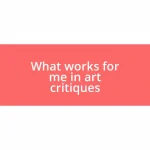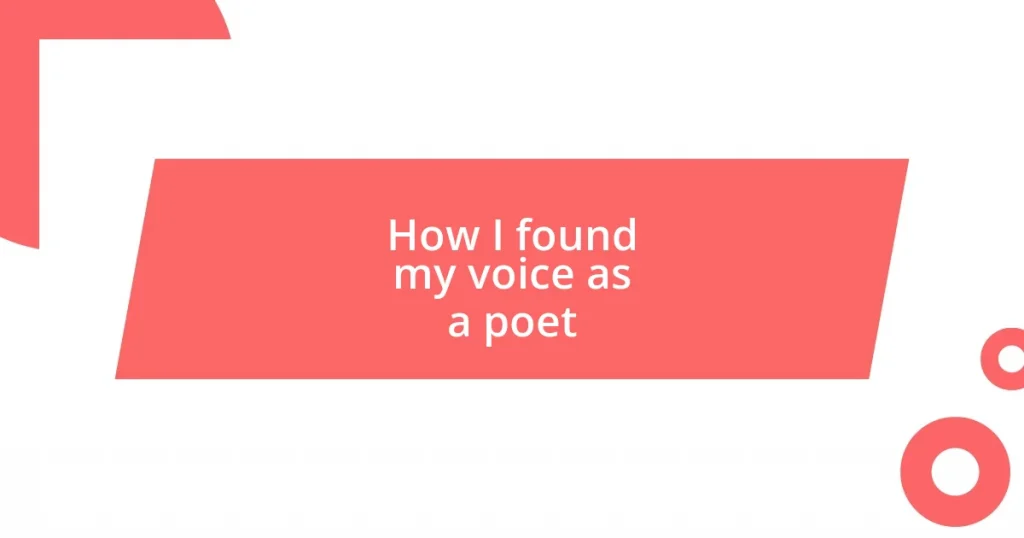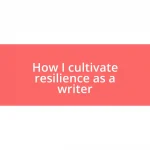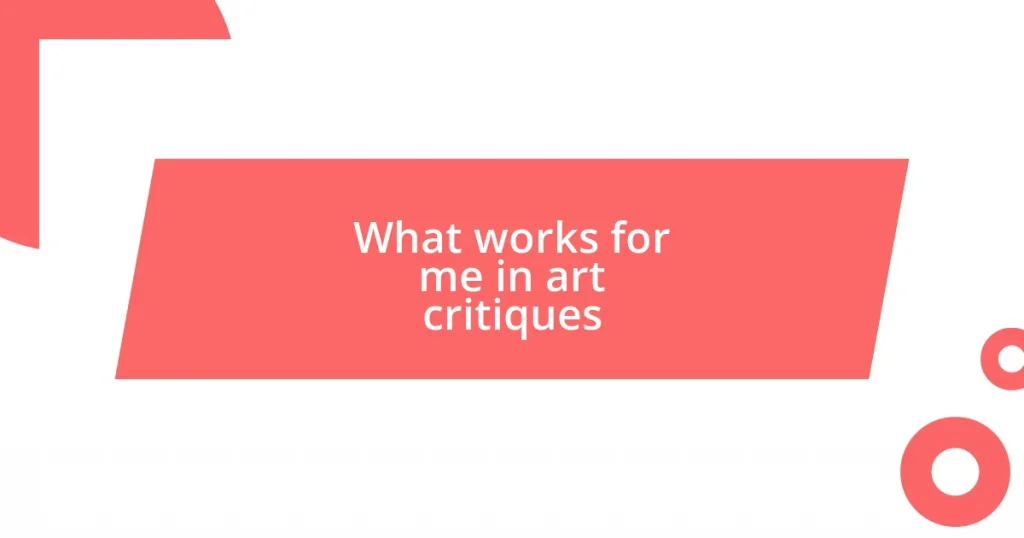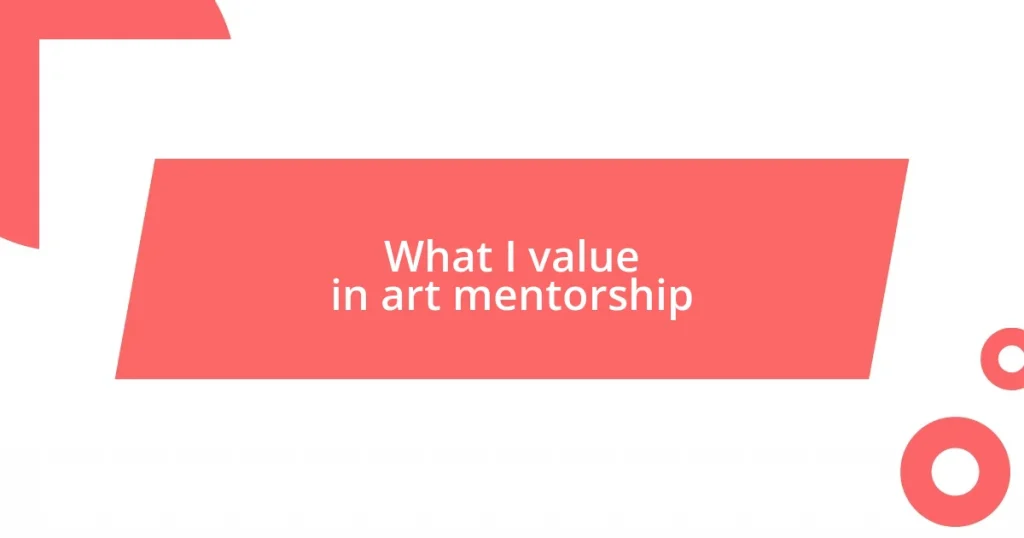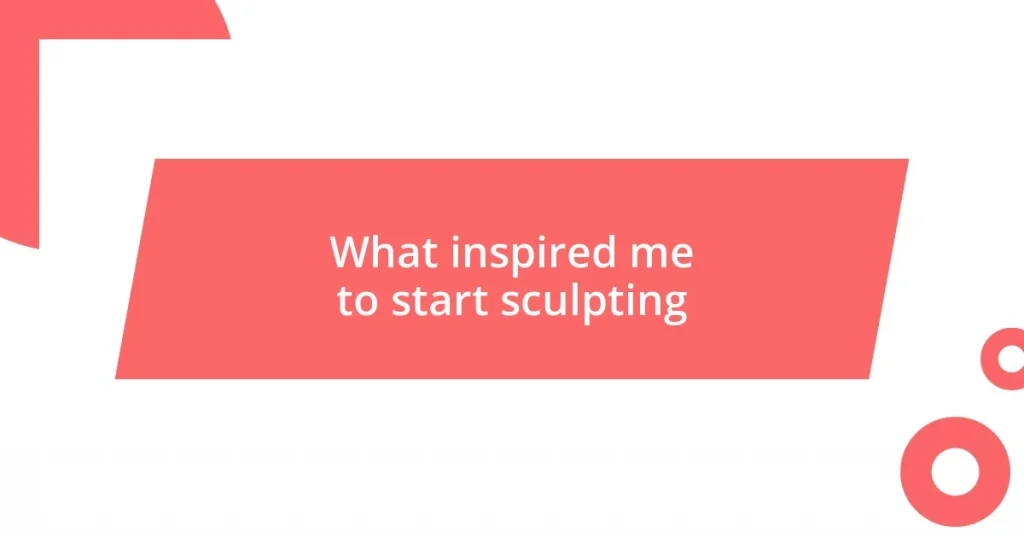Key takeaways:
- Self-discovery through vulnerability: Sharing personal poetry revealed the power of authenticity, opening a deeper connection with both self and others.
- Influence of other poets: Discovering works by Maya Angelou, Walt Whitman, and Rumi inspired unique stylistic choices and encouraged introspection and emotional depth.
- Embracing originality: Learning to appreciate personal experiences and imperfections led to a more authentic poetic voice, transforming everyday moments into rich literary expressions.
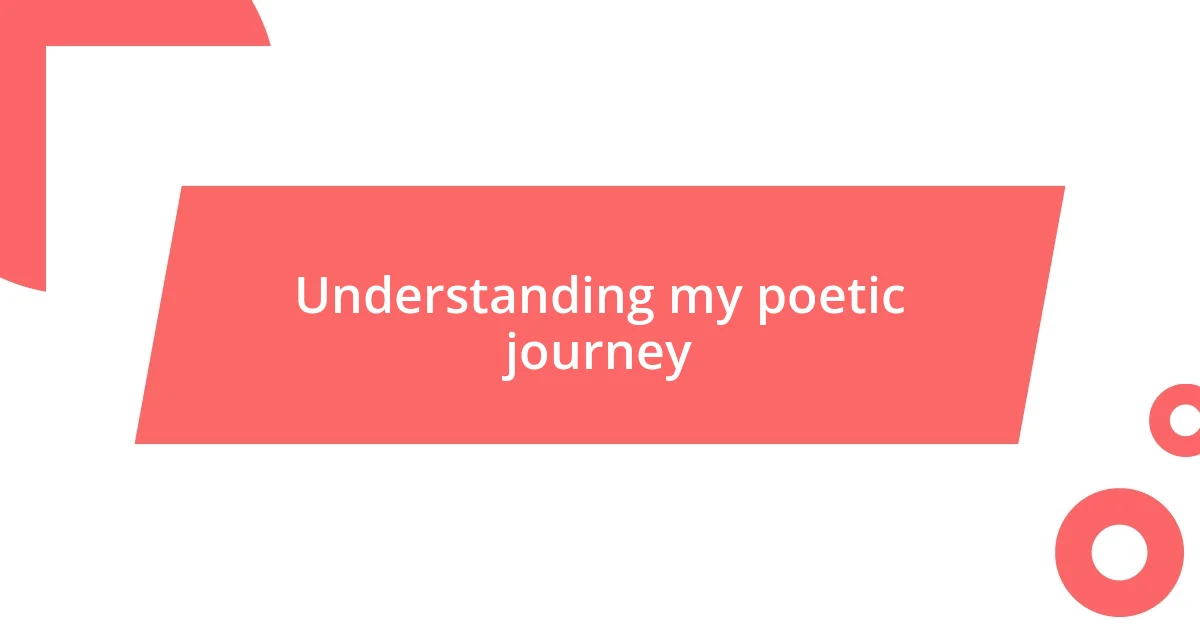
Understanding my poetic journey
Reflecting on my poetic journey, I remember the first time I scribbled verses in the margins of my notebook, feeling more like a mad scientist mixing potions than a poet. What was it that compelled me to transform my thoughts into words? The thrill of exploring raw emotions through poetry drew me in, igniting a spark I didn’t realize existed.
As I navigated my early attempts, I often wrestled with self-doubt, wondering if my voice was worth hearing. One night, sitting on my bedroom floor surrounded by crumpled papers, I penned a piece about longing that resonated deeply with me. Sharing it with a close friend was a pivotal moment; their encouraging response opened my eyes to the impact of vulnerability in poetry.
There’s something magical about discovering your unique style, like unearthing a hidden treasure within yourself. Over time, I learned to embrace the complexities of my experiences—love, heartbreak, joy, and sorrow—and weave them into my work. Have you ever felt that sense of wholeness when you express your true self? For me, that realization marked the beginning of a deeper connection with my voice and the world around me.
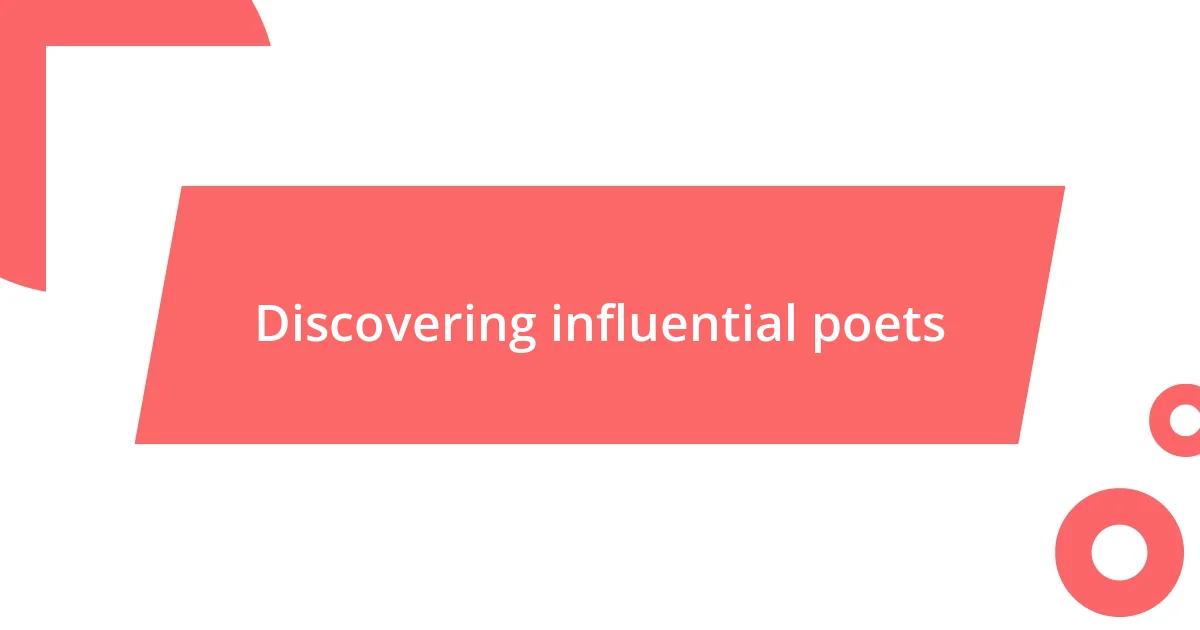
Discovering influential poets
Discovering influential poets has been a transformative part of my poetic journey. I vividly recall diving into the works of Maya Angelou and feeling the weight of her words resonate within me. It was as if she had unlocked doors to experiences I had yet to articulate, and suddenly, I felt less alone in my emotional landscape.
As I unfolded the pages of Walt Whitman, I found myself captivated by his celebration of individuality and nature. His free-verse style inspired me to break away from traditional structures, urging me to carve my unique path. When I wrote my first free-verse poem, it felt liberating, like shedding a layer of skin I didn’t realize was constricting me.
Each influential poet I discovered became a mirror reflecting parts of my soul I had yet to explore. I remember the day I stumbled across Rumi’s verses; reading them felt like drinking in pure wisdom. His ability to convey profound truths in simple phrases made me reevaluate my own voice and the authenticity of my expressions. Isn’t it fascinating how words from another time can still feel so personal?
| Influential Poet | Key Impact |
|---|---|
| Maya Angelou | Unlocked emotional expression |
| Walt Whitman | Inspired free-verse poetry |
| Rumi | Encouraged introspection and authenticity |
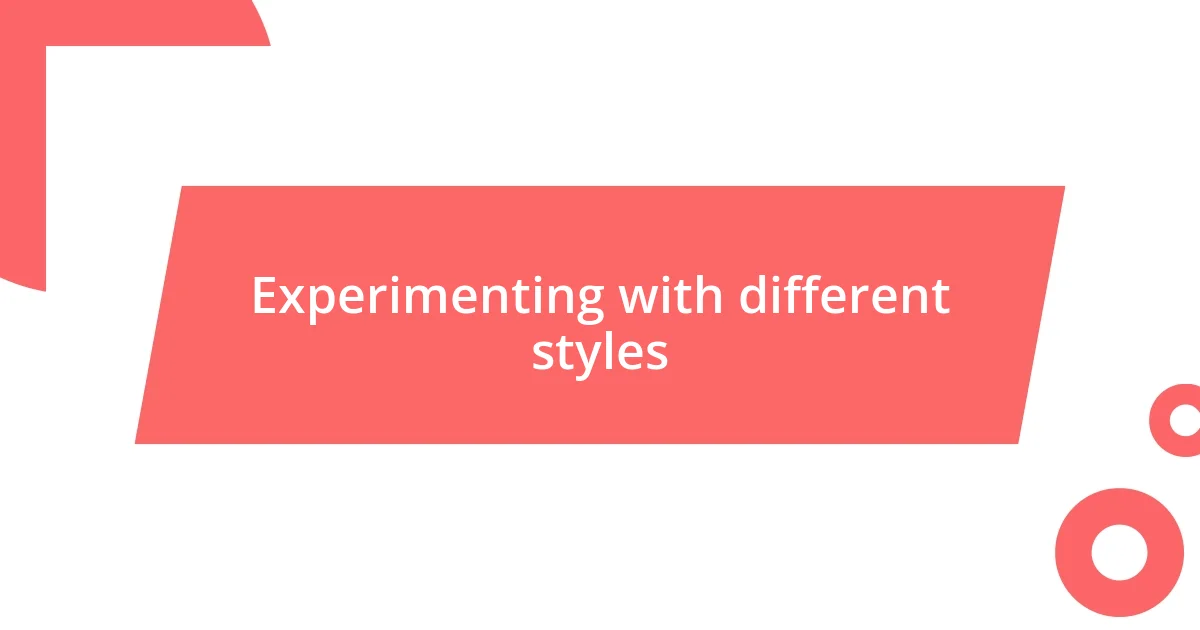
Experimenting with different styles

Experimenting with different styles
I found that experimenting with different styles opened doors in my mind that I never knew existed. Early on, I dabbled in sonnets, rigid structures that felt like confining chains at first. Yet, when I let go of perfection and allowed my ideas to flow, I discovered an exhilarating freedom. One night, I wrote a haiku about winter’s quiet beauty during a snowstorm. The simplicity helped me appreciate the power of brevity. Each line became a delicate brushstroke of imagery, and I learned that sometimes less is indeed more.
Trying my hand at slam poetry was another transformative experience. The raw energy and urgency of performance cracked me wide open. I remember the rush I felt on stage, my heart pounding as I shared my story of loss and resilience in front of a crowd. It was exhilarating to witness the emotive connection forged through rhythms and spoken word. This experience taught me that poetry isn’t just about written words; it’s about sharing and connecting through music and emotion. Here are a few styles that significantly influenced my journey:
- Sonnets: Taught me about structure and the beauty within constraints.
- Haikus: Helped me appreciate the art of brevity and imagery.
- Slam Poetry: Introduced me to the power of performance and connection.
- Free Verse: Allowed me the freedom to express my voice without limitations.
- Narrative Poetry: Enabled me to weave storytelling with emotional depth.
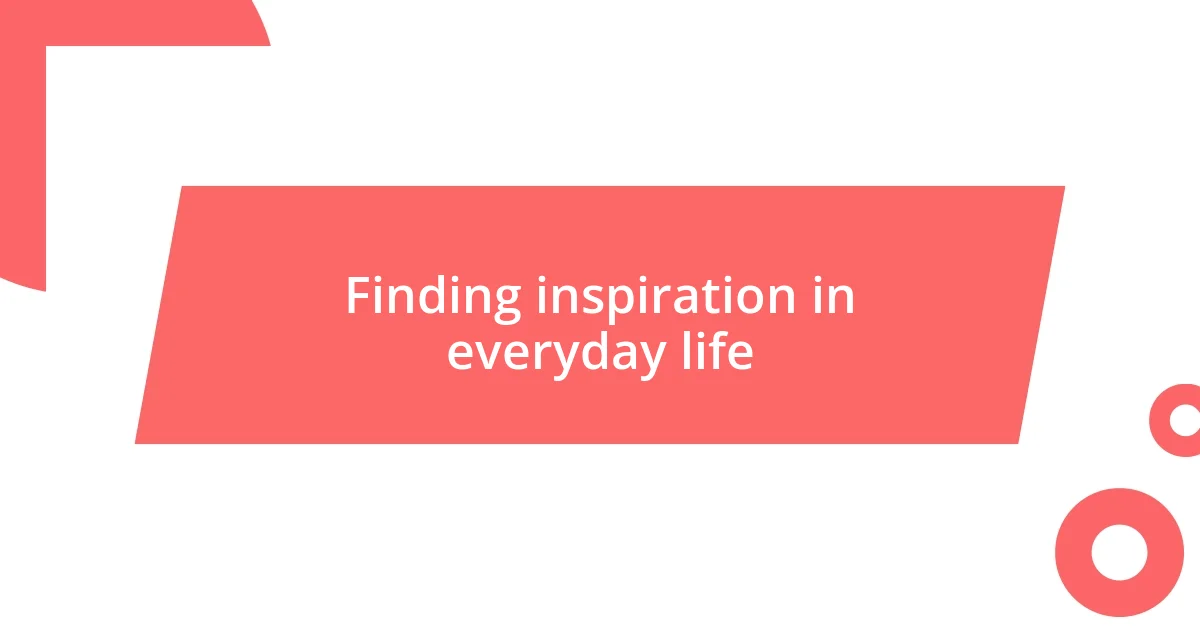
Finding inspiration in everyday life
Everyday life is a rich tapestry of experiences, and I find inspiration in the most unexpected moments. Just the other day, as I walked through the park, I noticed a little girl chasing butterflies. Her laughter rang out like music, and it struck me how often we overlook the simple joy around us. This moment sparked a poem about fleeting childhood and the innocence we tend to leave behind. Have you ever paused to capture a fleeting moment in your writing?
Conversations can also be a wellspring of inspiration. I remember a rainy afternoon spent with a friend, sharing stories from our pasts. Our laughter mingled with the sound of raindrops, and the collective nostalgia ignited a fire within me. That exchange led me to write a piece about friendship and shared memories, underscoring how deeply our connections shape our identities. Isn’t it interesting how a simple chat can transform into words that resonate with others?
Nature whispers poetry to us if we take the time to listen. Early mornings are my favorite; the world feels fresh, and the air is filled with possibility. One crisp dawn, I observed the sun rising over the horizon, painting the sky in hues of orange and pink. That beautiful spectacle inspired a poem reflecting the hope that dawn brings, a reminder that every day is a blank canvas. How do you connect with nature when seeking inspiration?
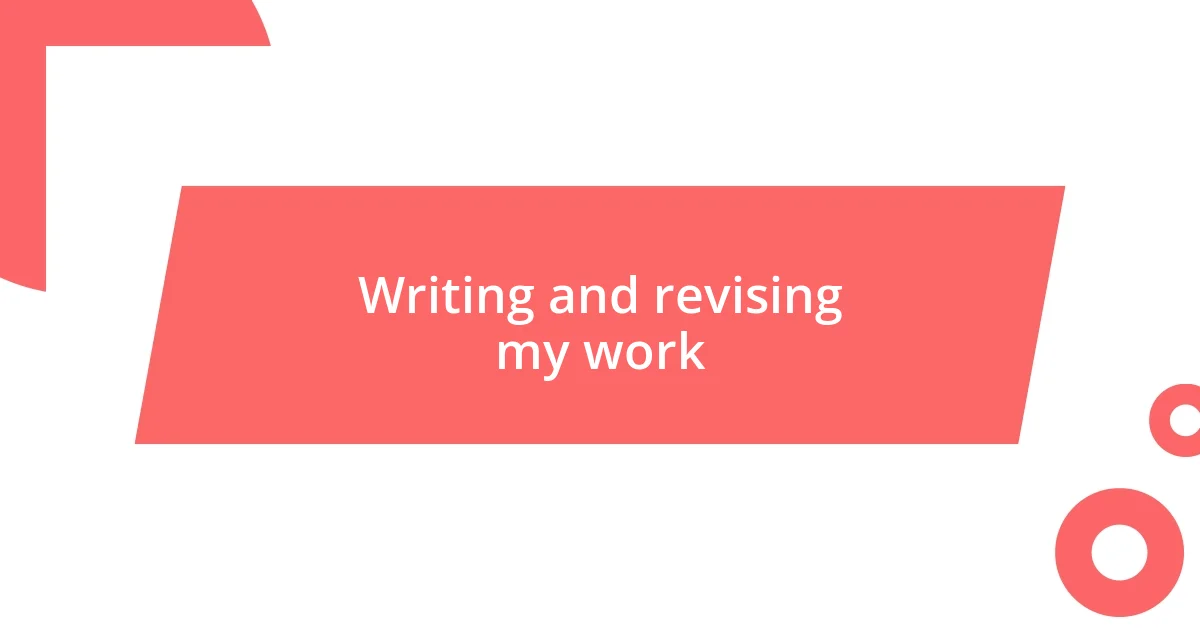
Writing and revising my work
Writing is a deeply personal process for me, one that often feels like a dance between expression and introspection. I remember the first time I revisited a poem after letting it sit for a few weeks. It felt like stepping back into an old room filled with memories. Some lines sparkled with clarity, while others felt clumsy and in need of a gentler touch. Revising taught me that what may seem brilliant in the moment can benefit from distance, allowing fresh perspectives to illuminate the path forward. Have you ever found that sometimes a little time allows you to see your work with new eyes?
In my experience, revision is where the real magic happens. I often grapple with whether to keep a line that feels just right but doesn’t serve the overall flow. I recall slashing through my own work one late night, almost in a frenzy, saving the essence of what mattered while letting go of the excess. It was liberating! The final result transformed into a more powerful piece, resonating more than I could have imagined. Isn’t it fascinating how wielding the metaphorical red pen can breathe new life into our creations?
I often return to the idea that poetry isn’t merely about writing; it’s about honing and refining each word until it feels just right. The emotional journey of revising can be tumultuous; some pieces challenge me to confront my vulnerabilities. One particular poem about my struggles with self-doubt had me in tears during revisions. Yet, those tears became a catalyst for honesty in my writing, ultimately allowing me to craft a more authentic piece. How does confronting one’s own feelings during the revision process impact your writing? I find that leaning into discomfort often paves the way for profound discoveries.
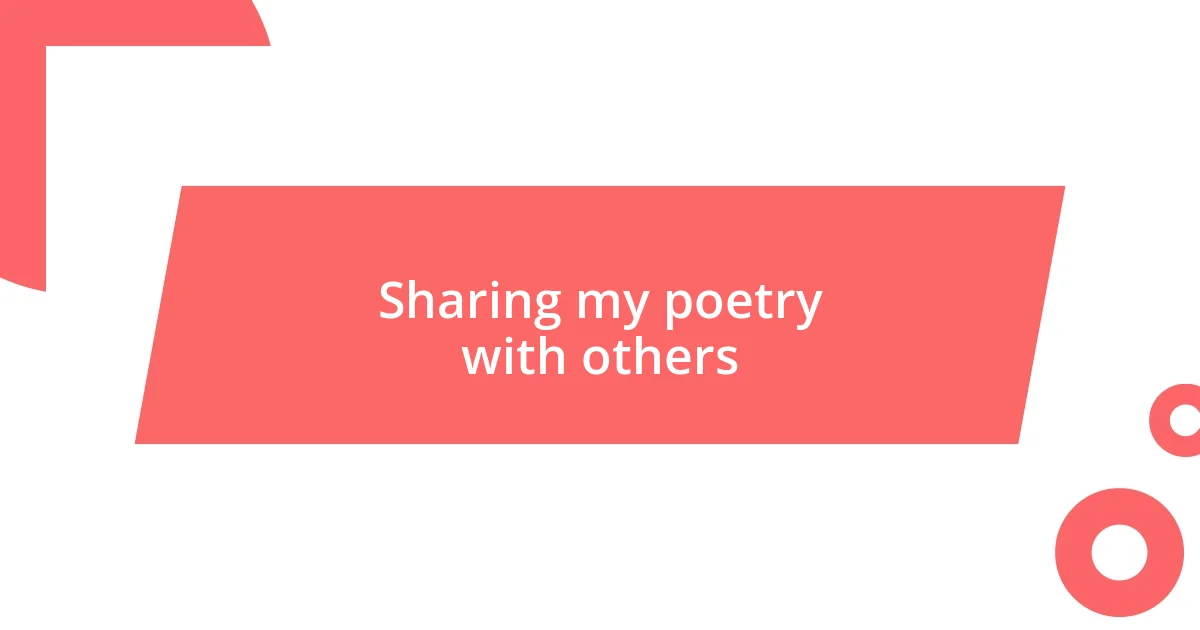
Sharing my poetry with others
There’s something incredibly exhilarating about sharing my poetry with others for the first time. I vividly remember reading my work aloud at a local open mic night. My hands trembled as I stood at the podium, but the moment I spoke the first line, a hush fell over the crowd. It felt as if a connection sparked in the air, and that shared silence was a gift—an opportunity to share a piece of my soul with strangers who might just see a reflection of themselves. Have you ever faced that nerve-wracking leap of vulnerability?
What truly surprises me is the power of feedback when I share my poems. After reading about loss and longing, a listener approached me in tears, sharing how my words resonated with their own experiences. That moment taught me how poetry can be a bridge, linking thoughts and emotions we often grapple with alone. It made me wonder, isn’t it remarkable how the act of sharing can spark such profound conversations, deepening the connection between writer and reader?
I often find encouragement in community, whether it’s through poets’ groups or literary forums. Joining a workshop opened new avenues for me; the supportive critiques from fellow writers helped refine my voice. I recall one session when an attendee pointed out a recurring theme in my work—identity. This insight pushed me to explore that theme more deeply, resulting in a collection that reflects my journey. Don’t you love how sometimes others can help clarify our own thoughts, nudging us toward a more profound understanding?
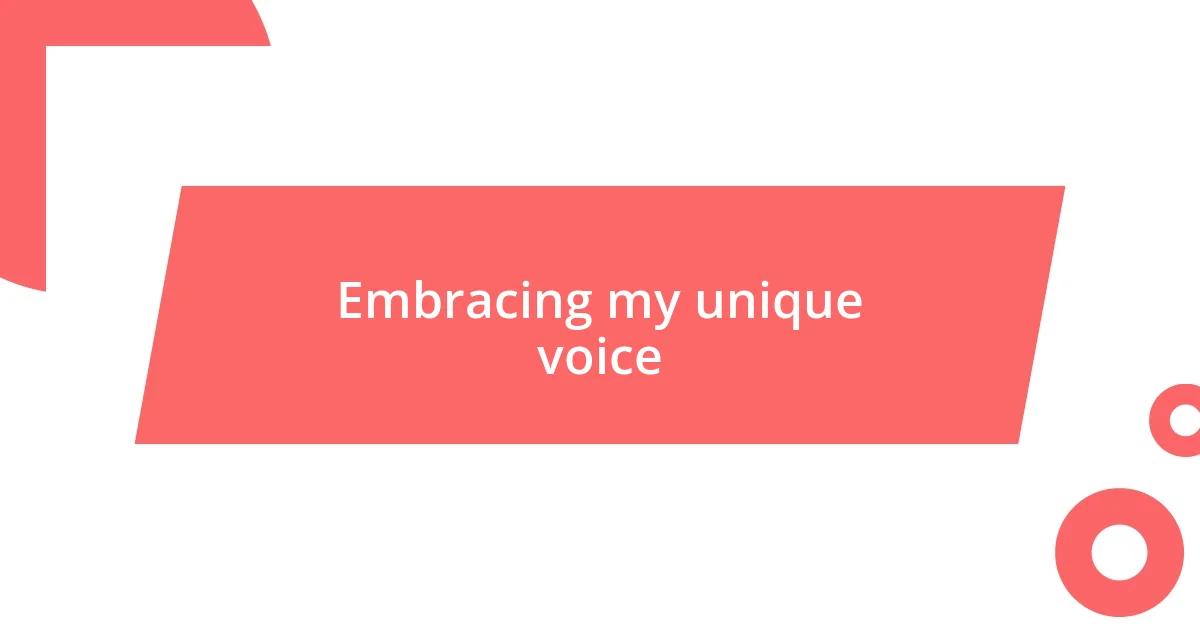
Embracing my unique voice
Embracing my unique voice as a poet has been both a journey and a revelation. I recall the moment I discovered that my perspective was inherently different from others. During a poetry workshop, I shared a piece reflecting on my childhood experiences with nature, and the feedback revealed that my vivid imagery resonated with everyone in the room. Have you ever felt seen in such a profound way? It was in that moment that I realized my voice has the power to evoke emotions and create connections.
I often think about the times I’ve tried to mimic the styles of poets I admired, only to feel like an imposter. Trying to write like them drained my creativity and left me frustrated. But then, I made a conscious shift—embracing my quirks and personal stories instead. I wrote a poem about the chaos of my morning routine, filled with spilled coffee and frantic searches for keys. Suddenly, I felt a bubbling excitement in my writing. How did I unlock that energy? I learned that authenticity lies in the mundane and that my everyday experiences are rich with poetic potential.
There’s something liberating about allowing my voice to shine, flaws and all. One evening, I wrote a poem laden with imperfections, using an unconventional structure that broke all the rules. I remember feeling nervous as I shared it with a trusted friend, but their enthusiastic reception filled me with unexpected joy. It became clear to me that embracing my distinctive voice meant celebrating those deviations from the norm. Isn’t it fascinating how our vulnerabilities, when laid bare, can transform into the most striking art? This realization serves as a constant reminder: my unique voice matters, and it’s worth cultivating.
